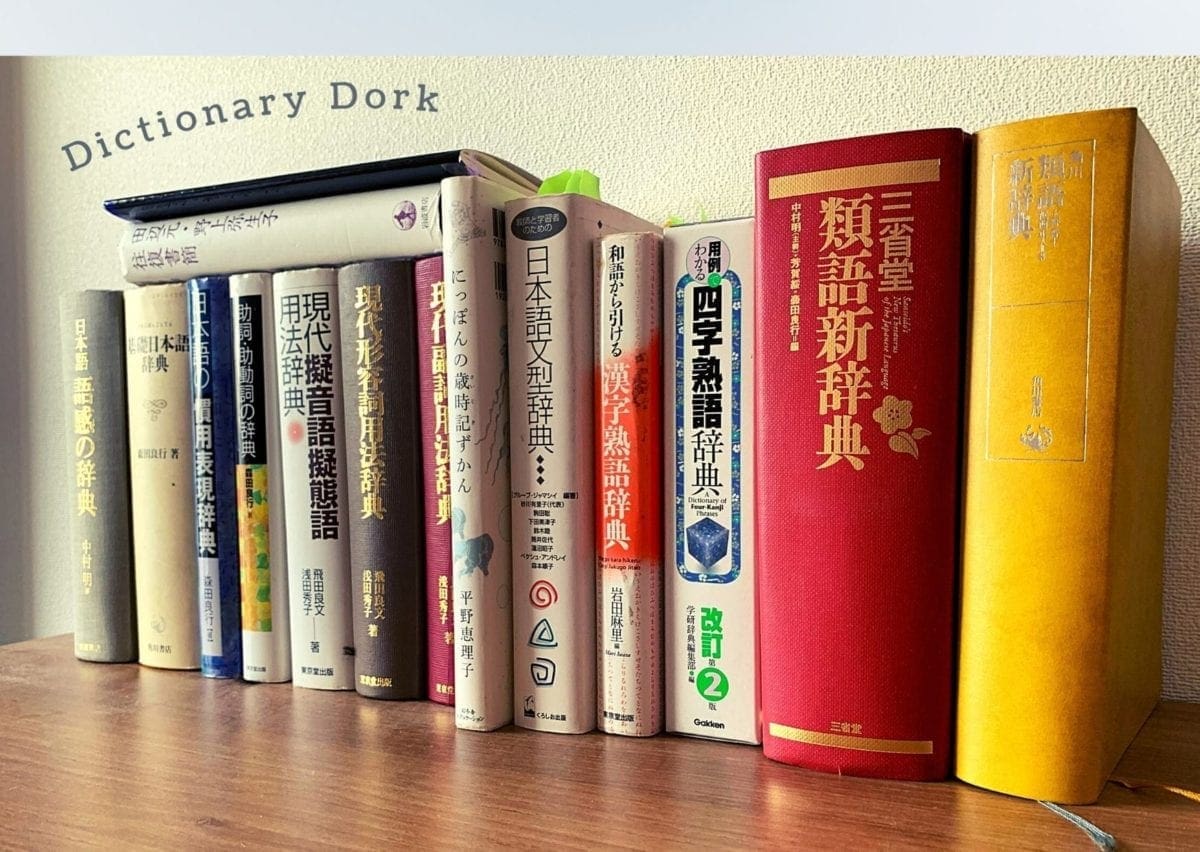
Dictionary Dork
People have hobbies. Some are into music, others like gardening. My brother, for example, is into cars. He can be forever out there in the garage fixing up and messing with his scrap cars. My friend, Mina, likes Doraemon, so when she sees anything Dora-chan appears on—a notepad, sweatshirt, or candy snack—it’s like those things are calling her name, and she has a hard time resisting them. My sister is a big, obsessed Disney fanatic. She collects and collects Disney character goods—Mickey Mouse, Minnie Mouse, Jack Skellington from The Nightmare Before Christmas, etc., etc… She just indiscriminately snatches them up with every bit of love and passion. It’s therefore natural that a decent-sized room in her home is filled with Mickeys. We call it… “Mickey’s Room.”
As for me, I’m big on dictionaries. I love them. I love digging deeper and deeper into words, jumping from one word to another, viewing them alongside related words and soaking them all in. So, naturally I collect dictionaries. Paper ones, of course, but a bunch of dictionary apps—both Japanese and English—continually reside on the first screen of my phone. On my desk, dictionaries by different publishers and in different categories are arranged neatly, comfortably within reach. Among them, are very specific ones that focus only on particles, or adjectives… maybe adverbs, or onomatopoeia. Then there are dictionaries devoted to four-kanji-character words, or idioms and colloquialisms…
With this passion in me, it was reassuring to see that Doc, who’s my favorite writer and whom I have immense respect for, consults his dictionary regularly and never neglects to confirm the true nuance of a word, making sure he’s not using the word incorrectly. Also, I’ve read Nobel Prize winner, Oe Kenzaburo, has used his Kojien dictionary (a massive volume like the Encyclopaedia Britannica) so frequently the pages have ended up falling off its binding.
Dictionary making has to be entirely arduous, and its accomplishment, the product of a maker’s blood, sweat and tears. Truly, an admirable effort. I was listening to a talk given in 1977 by the legendary scholar and linguist, Ono Susumu PhD, on audiobook, who compiled The Iwanami Dictionary of Early Forms of Japanese. According to him, the work of defining a word drains so much out of a lexicographer he can only analyze up to three words a day. It is quite a lonely uphill battle defining words—though, sacred almost—and must require an enormous amount of patience and perseverance.
After years of steady attention to dictionaries, I’ve found my favorite one. And, the one person I should really turn the spotlight on is Morita Yoshiyuki PhD. He too is a Japanese scholar, and has easily become my favorite dictionary maker and hero. The most cherished dictionary in my collection is his A Dictionary of Basic Japanese by Kadokawa. What’s so cool about this one is that he goes really deep into the most basic of words—even a simple suffix or auxiliary verb such as -teiru (ている) or a noun like mae (まえ)—and explains the words in full detail in a clear-cut way. For some entries, he takes four to five pages going step-by-step and walking you through several points of his analysis. He systematically illustrates the semantic features of words, going over their histories, the similarities and differences between related words, tense and usage, and any common misconceptions. It feels as though each word is being dissected by Morita’s sharp surgical knife on an operation table. The whole experience of learning in this fashion is fascinating and borders on enlightenment… No doubt he deserves all the acclaim the world can give, and his work is worth a million in gold bullion!
I have huge respect for him, and one day I’d love to have the chance to meet and convey to him how much I appreciate his work, and how I hold dear many of his books each and every day. “Mr. Morita…” I’d tell him, “You, sir, are a hero of mine, and you have inspired me to recognize learning is the most endearing form of entertainment.”
- 大江健三郎 (Oe Kenzaburo)
- 『広辞苑』 (Kojien)
- 大野晋 (Ono Susumu)
- 『岩波古語辞典』 (The Iwanami Dictionary of Early Forms of Japanese)
- 森田良行 (Morita Yoshiyuki)
- 『基礎日本語辞典』 (A Dictionary of Basic Japanese)
*みなちゃんへ
みーちゃんがもしこれを読んでくれてるとしたら…
前に、みなのこと書くかもしれないよーって言ってたの、やっぱり書きました。ドラちゃん好きは今も健在かしら。
お姉ちゃんより

